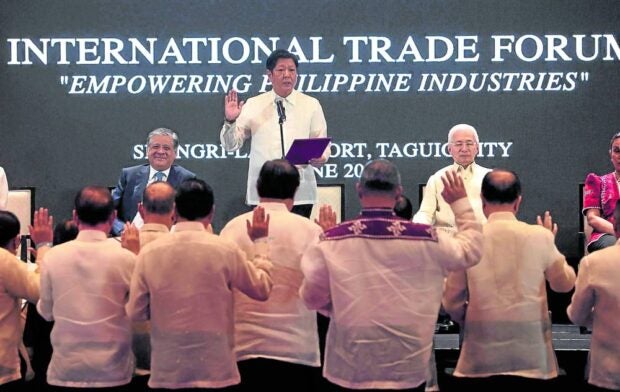
RAISING THE BAR President Marcos inducts officers of top business groups during the first International Trade Forum in Taguig City. —MARIANNE BERMUDEZ
President Marcos launched on Thursday an ambitious five-year plan that would more than double the country’s export target from the $127 billion this year to more than $240 billion in 2028.
“We can transform the Philippine export industry into a significant economic engine that will generate over a million high-quality and sustainable jobs,” the President said during the launching of the Philippine Export Development Plan (PEDP) at the Shangri-La The Fort hotel in Taguig City.
“The Philippines can establish itself as an agile export powerhouse by the year 2028,” Mr. Marcos said, insisting that “achieving more than double our current level of exports is, in fact, a realistic target.”
He said that while PEDP was being crafted, he came across an “eye-opening statistic” that 40 percent of all the country’s exports come from the electronics sector alone.
“The level of diversification is something that we have to look at and we have to improve in the coming years. But we also recognize that there is great potential in the sector. No less than $49 billion worth of revenues remains untapped and unlocked by the industry,” he added.
According to the PEDP, the government will redouble its efforts in eight sectors: electronics, business process management, mining, agriculture, transportation, clothing, chemicals, and home furnishings.
Forge vital agreements
For 2023 alone, these eight sectors are expected to contribute $112.3 billion, which comprises almost 90 percent of total exports amounting to $126.8 billion.
By 2025, the government plans to raise revenues from these same sectors to $213 billion, or 88.5 percent of the projected total exports of $240.5 billion.
The Chief Executive also highlighted the importance of free trade agreements (FTAs) in the country’s export agenda.
He cited the Regional Comprehensive Economic Partnership agreement, which came into force this month, that would allow the Philippines to expand its reach to 15 other nations in the agreement.
Mr. Marcos said the Philippines must continue to forge other “vital” free trade agreements and preferential systems, but he underscored the “crucial” need for the private sector and the government to prepare the country for the global market.
“Our participation in these trade agreements not only deepens our economic integration, but also demonstrates our global competitiveness. Hence, we must continue to forge these vital agreements and preferential systems,” he said.
‘Strengthen trade’
“That is why we have to bring up our export game a little bit and support our exporters so that they can compete in foreign markets, and that they are able to be, not only suppliers, but also industrial consumers of the products that are around the world. In other words, to strengthen trade,” he said.
The President said that the Philippines will be soon signing a free trade agreement with the South Korean government and is now working on signing FTAs with the European Union and the United States.
“The reason we are doing this is we want to open markets so that the Philippines will be able to export to and import from. So it’s not one way, it’s straight—and that is the most important thing. But what we have to do is to allow ourselves the restructuring of some of the elements that are within the law, that are within the rules, so that we can compete on an even basis,” he said.
READ: Marcos wants to ‘design, customize’ Maharlika fund to PH’s needs